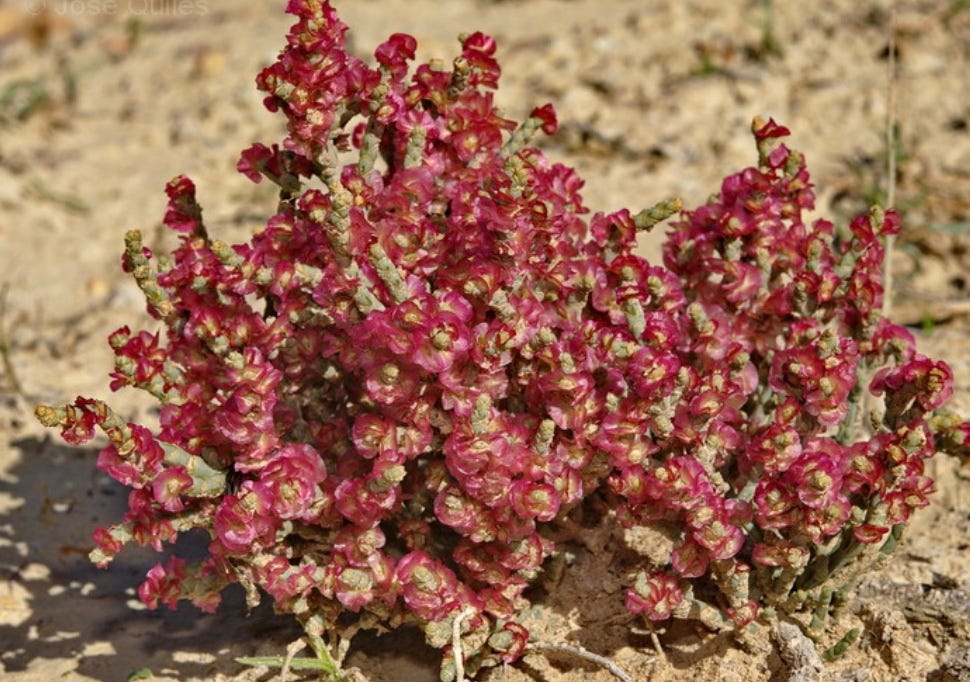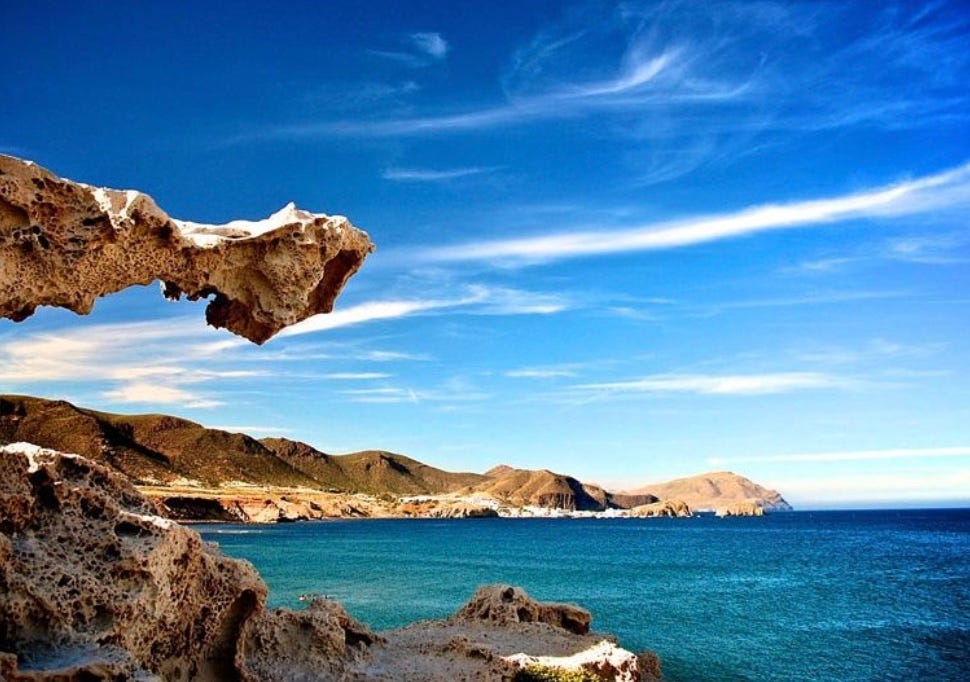Returning to the desert of Tabernas again this week, as I continue my walk and encounters with the people there. People who had bought corners of this dried and scorched place in southern Spain and decided to etch out a life for themselves. I was fresh out of a two year course in Permaculture and Practical Sustainability back in Ireland at the time, and had decided to travel overland through France and Spain visiting various projects and communities. In reality it was a love of Sergio Leone’s Western’s that brought me to Tabernas in the end, the place where he shot his early movies, and so it felt poignant to meet this bunch of ‘outlaw’ like characters whilst there.
Part 2:
Having left Lawrence’s land I wander on with Phil…
There’s a silence between Phil and me, one I appreciate after Lawrence's incessant chatter. Phil somehow reminds me of a badger. He’s stout and close to the ground, with a head of grey hair that just touches his ears. He moves unhurriedly, hands in his pockets, his eyes scanning the terrain and sky. I sense Phil would prefer silence, but my presence seems to coax words from him; he mutters at times, and I can’t always tell if his words are for me or himself. Over time, I realize he’s an amateur expert in desert ecology. As we walk, the landscape around us comes into sharper focus.
“This is the land of heroic survivors,” he says suddenly. “You don’t last long here if you aren’t tough.” He stops and takes a broad stance, pausing as if to share some wisdom he feels I should know. “Some plants grow fast and set seed before the drought kills them; others grow ferociously slow. Thyme steals water from other roots, and Anarbasis articulata—a plant with little ruby-red flowers—photosynthesizes at night.” He lets that sink in. I feel a wave of disappointment at myself, wondering why everything here had looked like drab rock and dust to me, while for Phil, it’s a source of endless fascination.
We sidestep ant mounds and watch lines of workers heading out and returning. Phil bends down, pulls sprigs of wild thyme, and tucks them into his pocket, then picks leaves from another bush. “Artemisia,” he says. I try to look through his eyes rather than my own, seeing the world as he does.
“This land doesn’t hold water,” Phil observes, his tone slow and steady. I glance around. The earth is baked dry, and the rain channels leave shadows over scattered wildflowers. “Floods rush through but never get absorbed. You see all these exposed banks? They’re carved clean.” He smiles at his own turn of phrase.
“Do you have your own house and land?” he asks.
“No,” I respond.
“Well, you should. Every man needs that.”
“You didn’t have to eat that goat heart, you know,” he adds, pausing to face me on the path.
The last of the meat still lingers in my mouth, and my discomfort must show. “Spit it out,” Phil says, turning and walking on.
The sun’s heat whistles in the air, a low, searing pitch. The desert is otherwise quiet, apart from the occasional eagle’s call and the rumble of distant rockfall. Phil grumbles, muttering names and grievances through his London accent as if talking to the ground itself. He drifts between distant thoughts and the present, sharing his knowledge with me and checking in occasionally. I ask about his house.
“I built it myself, almost entirely on my own, with little help or machinery. Made it invisible. Don’t want them to see it.” He glances at the sky and nods. “Satellites, you know, watching everything.”
After a short silence, Phil stops. “Well, can you see it?”
“See what?” I ask, confused.
“Look again,” he says.
I can’t see anything but dry earth and ravines where rivers once flowed.
“Look,” he says, working a thumb over the palm of his hand, spitting into the soil, and shaping it into a paste. “Clay. It’s everywhere here. That’s what I built with. Look closer.”
Ahead of us, something seems almost out of place—a mound of earth, slightly rounded. “You mean that?” I ask, pointing.
“Yes, that,” he replies.
I’m stunned. His home is nearly invisible, blending into the landscape as if it’s part of it. Whatever’s beneath that mound, no passing satellite would be the wiser.
“How long did it take you?” I ask.
“Years,” he says. “I’m still finishing it. Come on, I’ll show you inside.”
Phil leads me along a low perimeter wall lined with tiny succulents to a wooden door, bolted with three separate locks. As the door closes behind us, the silence of the outside world falls away, and I feel the weight of stone above us. Light filters in through glass blocks in the roof, casting shafts of color against the sandy walls.
“I found those in a dump,” Phil tells me, guiding me through a narrow passage with smooth clay walls. We reach a small kitchen, everything the color of sand. A mosaic of a woman pouring water lies at our feet, smudged with dirt and boot prints.
“So, you’ve come to Tabernas to find a piece of land?” Phil asks, preparing tea.
“No,” I say, “I’m just visiting.”
“You should consider it. I don’t need much here, don’t need to go anywhere.” He smiles that curious smile. The truth is, I don’t know why I’ve come to the desert or what I’m seeking. But sometimes, the journey brings the questions—and maybe even an answer.
“What do you do?” I ask, deflecting the attention.
“I paint,” he says. “Garden, walk the hills, sometimes drink too much,” he laughs, “depends how often I see my friend Foulcet.” He hands me a cup of tea and meets my gaze. “Do you paint?” he asks, almost challenging me.
“No,” I say.
“Well, pick up a craft. A man needs that.”
He stands, thinking, then looks at me. “Come on, I want to show you something.”
We head back down the narrow passage to a blue door made from wood strips. As he opens it, clay dust falls, and we step inside his studio, the air thick with suspended dust. Shelves hold small statues, trinkets, and candles, their wax dripping over the edges. A Virgin Mary statue teeters, draped in dust.
“This is where you’ll find me,” he says. Phil walks directly to a painting canvas in the centre of the room. He pulls off a sheet and lets it fall to the ground. ’ I had to paint flowers I remembered from home, from the UK, he says. A painting of brightly painted flowers circled with a crown of leaves is revealed. It stands out in the room, almost victorious, like spring overcoming a long, hard winter.
“Do you go home much?” I ask.
He grimaces. “No. There’s nothing there for me.”
Phil finishes what he is doing and turns to me. ‘You know, he says, as much to me as to himself, ‘I am going to the UK this summer to bring that painting to my daughter. She’s getting married. She’s the only one I’d travel home for.’
We spend a short time in Phil’s studio, his inner sanctum. He moves through canvases, muttering to himself, while we sip tea and talk of home.
“You’re lucky, you know?” he says. “Few visitors ever see my studio. Not even Foulcet.” He grins, the idea just occurring to him. “Let’s visit Foulcet, anyway, I need a drink!”
He locks the studio behind us, and we step back into the searing desert heat. Phil’s scarf drapes over his grey hair like that of a desert pilgrim, oblivious to the heat. We walk toward the mountains. “I should warn you about Foulcet,” he calls over his shoulder. “He’s, well, a little mad,” he laughs.
Until next time







A fascinating read,I can’t wait for part 3.
Thanks for sharing.